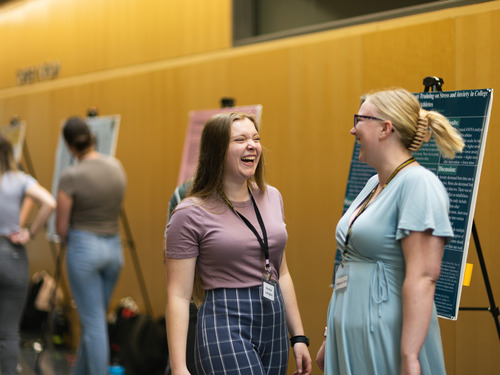OpportunitiesDepartment of Psychological Science

The Psychological Science Department at Gustavus has numerous opportunities for you to develop skills and build closer relationships. Through the supportive community of other students and faculty, students discover how research, an internship, or studying away can enhance your college experience and help you discern the career or graduate work to pursue.
Discover the Opportunities with Psychological Science
-
Research Student-faculty research opportunities are abundant within the Department, giving you practice interrogating questions, gathering data, and doing analysis. Faculty are doing research in areas such as multi-sensory perception, self and identity, sexual violence, prejudice, self-compassion, positive psychology, false memory, and adolescent development.
-
Internships Apply the science and theory into practice through an internship. Since the skills gained in this major can lead to a wide variety of careers, many students pursue an internship to hone their post-graduation plans.
-
Career Paths The study of Psychological Science is an incredible foundation to numerous careers. Department faculty and staff in the Career Center are able to help you navigate your career path.
-
Community-Engaged Learning Many students in the major volunteer with one of these popular options. Wednesday Friends fosters meaningful relationships with adults who have special psychiatric needs to promote the continued development of fundamental social skills through creative and intentional programming. Study Buddies works in direct contact with students of all ages and backgrounds doing tutoring, reading and math, or other classroom tasks.
-
Student Clubs The Department supports two student clubs. Psi Chi is the international honor society of psychology, where members sponsor a number of social and educational activities that are open to all major students. The Social Justice League's goal is to highlight intersections between psychology and social justice to engage in actions that dismantle systemic racism and work toward a more just world for all people.
-
Study Away The flexibility of the major allows students to spend time studying away from campus in such far-flung locales as Sweden, Northern Ireland, Japan, and Australia. Many programs in other countries offer classes that can count toward major requirements, and the perspectives gained from being in another culture often enhances research back on campus. Learn more about studying away from the Center for International and Cultural Education.
-
Departmental Honors and Awards Each year the Department recognizes students demonstrating strong academic performance.
-
Facilities for Learning The facilities of Beck Academic Hall augment the incredible faculty work. The classrooms are designed for collaboration, and lab spaces have equipment to conduct a wide variety of research projects, from neuroscience to eye tracking to sound waves. There is equipment to study adults, as well as a child development center for youth research.
-
Going to Graduate School Graduate school provides students with application-based education to develop competencies and qualifications for specific careers in the field. Faculty help students discern if graduate school is the right path for them based on their career goals.
-
Reference letters from the Psychological Science Department Faculty may write a letter of reference for graduate school. Here is more information about what faculty need to write a letter.
- Cover Letter: You should include a letter that explains the type of program that you are applying to (e.g., Clinical Psychology, Counseling Psychology, Educational Psychology, Research Psychology — e.g., cognitive, developmental, social, neuroscience, etc.). In addition, it is helpful to explain why you are applying to that particular program, and you should include your research interests. It may be helpful to include your educational and career objectives. If you have conducted a research project and/or presented at a conference, include the title of your work and a brief description. Also describe any research apprenticeship or research assistant experiences.
- Resume: You should include a resume or list of recent accomplishments and/or employment. Please include your undergraduate GPA as well.
- List of Courses: Include a list of courses that you have taken from the professor, with the semester and year taken. You should also include the grade that you received in that course.
- List of Graduate Schools, Programs, and Deadlines: It is beneficial to include an organized list of the schools that you are applying to, what the program is (M.A., Ph.D., etc.), and deadline that the school gives. You should also include a column indicating the "instructions", i.e., whether the professor should return the letter to you or send it directly to the school using the provided addressed envelope. In this document, it is most helpful to list the schools in order of when the letters are due.
- Forms and Access to Information Waiver: Some universities require that your professor fill out a standardized evaluation form in addition to a recommendation letter. Complete the identifying information on the form before giving it to your professor. The school will probably want your name and the program you are applying to. Some forms require that you decide whether to waive access to the information that your professor is providing about you. Choose whichever option you feel comfortable with, but your professor may prefer that any information that he or she provides remain confidential.
- Submission Instructions: Clearly identify if the letter is being sent directly to the university or if it needs to be returned to you. If it is to be returned to you, write the name of the university somewhere on the envelope so you will know which school the envelope should be sent to. Remember that any reference letter that is given to a student recipient is generally required to be in a sealed envelope.
